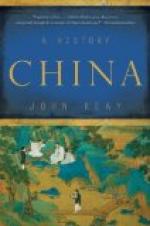This rapid industrialization was accompanied by an unusually fast development of agriculture. A land-reform program limited land ownership, reduced rents, and redistributed formerly Japanese-owned land. This was the program that the Nationalist government had attempted unsuccessfully to enforce in liberated China after the Pacific War. It is well known that the abolition of landlordism and the distribution of land to small farmers do not in themselves improve or enlarge production. The Joint Council on Rural Reconstruction, on which American advisers worked with Chinese specialists to devise a system comparable to American agricultural extension services but possessing added elements of community development, introduced better seeds, more and better fertilizers, and numerous other innovations which the farmers quickly adopted, with the result that the island became self-supporting, in spite of a steadily growing population (thirteen million in 1968).
At the same time, the government succeeded in stabilizing the currency and in eliminating corruption, thus re-establishing public confidence and security. Good incomes from farming as well as from industries were invested on the island instead of flowing into foreign banks. In addition, the population had enough surplus money to buy the products of the new domestic industries as these appeared. Thus, the industrialization of Taiwan may be called “industrialization without tears,” without the suffering, that is, of proletarian masses who produce objects which they cannot afford for themselves. Today, even lower middle-class families have television consoles which cost the equivalent of US $200; they own electric fans and radios; they are buying Taiwan-produced refrigerators and air conditioners; and more and more think of buying Taiwan-assembled cars. They encourage their children to finish high school and to attend college if at all possible; competition for admission is very strong in spite of the continuous building of new schools and universities. Education to the level of the B.A. is of good quality, but for most graduate study students are still sent abroad. Taiwan complains about the “brain drain,” as about 93 per cent of its students who go overseas do not return, but in many fields it has sufficient trained manpower to continue its development, and in any case there would not be enough jobs available if all the students returned. Most of these expatriates would be available to develop mainland China, if conditions there were to change in a way that would make them compatible with the values with which these expatriates grew up on Taiwan, or with the Western democratic values which they absorbed abroad.




